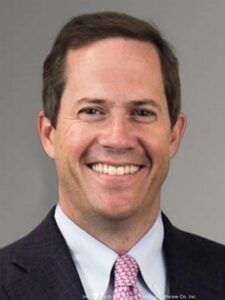Acadia Healthcare Announces Christopher Hunter as New Chief Executive Officer
 Acadia Healthcare Company, Inc. (NASDAQ: ACHC) today announced that its Board of Directors has named Christopher Hunter as the Company’s new Chief Executive Officer. He will join Acadia on April 11, 2022 and will serve on the Company’s Board of Directors. Hunter brings an array of executive and healthcare experience from prior senior leadership roles at Humana, TriZetto and BlueCross BlueShield of Tennessee. He replaces Debbie Osteen, who became the Company’s Chief Executive Officer in 2018 and oversaw more than three years of successful growth. Osteen has entered into a consulting agreement to assist with the transition and will remain on Acadia’s Board of Directors.
Acadia Healthcare Company, Inc. (NASDAQ: ACHC) today announced that its Board of Directors has named Christopher Hunter as the Company’s new Chief Executive Officer. He will join Acadia on April 11, 2022 and will serve on the Company’s Board of Directors. Hunter brings an array of executive and healthcare experience from prior senior leadership roles at Humana, TriZetto and BlueCross BlueShield of Tennessee. He replaces Debbie Osteen, who became the Company’s Chief Executive Officer in 2018 and oversaw more than three years of successful growth. Osteen has entered into a consulting agreement to assist with the transition and will remain on Acadia’s Board of Directors.

“The Board conducted a thorough and highly selective process to find a Chief Executive Officer who would complement our existing executive team and build on our strong foundation,” said Reeve B. Waud, Chairman of Acadia’s Board of Directors. “Chris brings the right combination of skills and expertise to lead Acadia as we continue to extend our market reach to meet the behavioral health needs of millions of Americans. His proven track record of leadership and innovative growth within the healthcare industry will ensure that we continue to execute our strategic growth plan with favorable results. At the same time, Chris believes in our objective to remain a patient-first organization focused on quality of care and an employer of choice delivering strong returns for our stockholders over the long term. Chris has the complete confidence of the Board, and we are fortunate to also have the support of a committed executive management team. Together, we look forward to the opportunities ahead for Acadia as we advance our position as a leading behavioral healthcare provider.
“We greatly appreciate Debbie’s important contributions to Acadia’s growth and success, and we are confident this will be a smooth transition of leadership. We are pleased to have Debbie remain on the Company’s Board as we continue to benefit from her expertise and valuable insight,” added Waud.
Hunter joins Acadia’s experienced and proven leadership team, bringing more than 20 years of healthcare experience and expertise across a range of sectors, multiple technology-focused companies, as well as the investment banking industry. Most recently, he served as President of Humana’s Group, Military & Specialty Segment, where he oversaw three distinct business units, totaling approximately $7 billion in revenue and serving 20 million members across 45 states. He also served as Humana’s Chief Strategy Officer with responsibility for all corporate strategy, merger and acquisitions and partnership activities.
“This is an incredible honor, and I am excited to join such a strong, respected organization that is addressing a critical societal need at a pivotal time for our country,” said Hunter. “With a growing patient base and an industry-leading executive team already in place, I’m looking forward to building on the successful trajectory set by Debbie and the leadership team. I am proud to work with Acadia’s committed facility leaders and 22,500 dedicated employees across the country with a shared mission to provide high-quality behavioral healthcare services to existing and new communities.”
Hunter received his bachelor’s degree with highest honors from the University of North Carolina at Chapel Hill and an M.B.A. from the Harvard Business School. His recent board experience includes AfterNext HealthTech (NYSE: AFTR), Availity, Youth Villages and the UNC-Chapel Hill Honors Program.
About Acadia
Acadia is a leading provider of behavioral healthcare services across the United States. As of December 31, 2021, Acadia operated a network of 238 behavioral healthcare facilities with approximately 10,500 beds in 40 states and Puerto Rico. With more than 22,500 employees serving approximately 70,000 patients daily, Acadia is the largest stand-alone behavioral health company in the U.S. Acadia provides behavioral healthcare services to its patients in a variety of settings, including inpatient psychiatric hospitals, specialty treatment facilities, residential treatment centers and outpatient clinics.



 The number one issue companies face when choosing where to relocate is access to available talent – immediate and future. With the continued growth of advanced technology enterprise in Texas, from autonomous vehicles to space technology, the jobs of the future are quickly coming to fruition. To continue to attract new business investment into the state, YTexas, an elite business network that provides resources for businesses moving to Texas, has partnered with the Texas Workforce Commission’s Texas Interns Unite!, and schools across the state to create programs that encourage current high school and college students to plan for their upcoming careers.
The number one issue companies face when choosing where to relocate is access to available talent – immediate and future. With the continued growth of advanced technology enterprise in Texas, from autonomous vehicles to space technology, the jobs of the future are quickly coming to fruition. To continue to attract new business investment into the state, YTexas, an elite business network that provides resources for businesses moving to Texas, has partnered with the Texas Workforce Commission’s Texas Interns Unite!, and schools across the state to create programs that encourage current high school and college students to plan for their upcoming careers.
